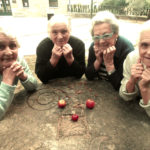Saraiva Senior: “We want to turn the care home concept on its head, we want to be disruptive in our sector and innovate”
Nobody wants to go into a care home. Based on this premise, Saraiva Senior, a project by Sacendi (a social and healthcare company that provides integrated services for the elderly in Pontevedra), aims to implement a new approach to care for the elderly. The company, a participant in BBVA Momentum, BBVA's support program aimed at social enterprises, is determined to change mindsets, promote a positive vision of aging and renew the traditional concept of the care home. The director of this social enterprise, Lucía Saborido, its associate director, Noelia López and its technical director, Ricardo Fra Otero, explain how.

What is Saraiva Senior?
Lucía Saborido: Everything began when Ricardo and I started a day care center in Pontevedra. It was the first of its kind in the city, and it got off to a rocky start –nobody knew what it was. People gradually began asking us to take care of more of their needs that were not being met. So the idea to create something arose out of the requests from users and their families,.
Something that wasn't just a normal care home…
LS: We aren't interested in the normal concept of care home, because satisfaction surveys show that no one wants to leave their own home. So we thought there should be a service for care in people's own home, but then we realized many people didn't have the necessary facilities: they didn't have showers, there were no lifts… We had to fit all the pieces in the puzzle. We began to investigate, and that was the start of Saraiva Senior, a concept in which we offer all Sacendi’s services in the same building. So there's a memory unit, a daycare center, a new-concept care home and living units with services.
We want to turn the care home concept on its head –we want to be disruptive in our sector and innovate. This is why we're in contact with Holland, Sweden… We were looking for information and we discovered the concept known as “housing”, meaning customizing services through the centralized personal care method. That is, we use their biography as a basis, and we adapt the care and the therapies to their capabilities, tastes and preferences. When a person turns up, we don't ask them what diseases they have, we see what it is that sustains them, what it is they like, and we reinforce that. This is a positive vision of old age. We don't want anyone to feel sorry for them, we want the person to continue just as they are for the longest possible time.
Noelia López: We're seeing a paradigm shift in the sector. Until recently the focus was on offering services to elderly people, and now our goal is to help them maintain their quality of life and to be self-sufficient for as long as they possibly can. So Saraiva Senior has two pillars: one is conceiving the space so they feel like they're in their own home; and the other is the type of care these people are given. The more we customize the methodology, the more we can exploit these capabilities and improve their self esteem. Saraiva Senior is where I'd like to come when I'm older, somewhere like my own home. The place would be decorated as though it were my home, and have a maximum of 30 people.
LS: We're going to offer users the whole range of services without taking them out of their environment, and surrounded by the same professionals.

You place a lot of emphasis on the therapists' training…
NL: The carer is key in the process of looking after people. The whole process of implementing the methodology is based on the knowledge of the person's biography, which gives rise to a very close relationship between the carer and the user.
Ricardo Fra Otero: What's more, by working with biographies the whole family becomes involved. It's a long process, but very enriching and constructive. The family starts to open up to you, and tell you what's on their mind. We have a family support unit.
How many places does this project have?
LS: There will be day care for 40 people, like we have now. They don't sleep there, and they have activities from Monday to Friday. The memory unit will be on an hourly basis, on demand. We have cohabitation units for 12 people, with a level of autonomy so they have a place where they can live in peace but not be alone. And then there's the residential care home for 24 people.
RFO: These are integrated and open environments so people can come and go as they please.
You've also located some empty premises…
LS: How many premises do you have at present with no activity? We want to install a Saraiva Senior in each city, so there's a place to go as we expand.
Is that where Momentum comes in?
LS: Yes, to see how to do it. I've spent two years of my life fighting on behalf of Saraiva Senior, due to obstacles in the legislation. We're going toward the “fifth-generation” concept like in Holland, and it's clear that in Spain we're light years away from the Nordic countries.
How do you approach the subject of prices?
LS: Here in Galicia care homes cost around 2,000 to 3,000 euros. Who can pay that? Our prices range from 1,000-1,400 euros, which is affordable for the users, perhaps with the help of their children.
RFO: We're looking for funding for these places.
NL: As everything's all together in the same space, we can share a professional team, so our business is viable. The professionals work in a team and optimize the resources we have.